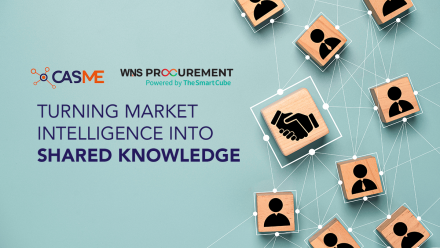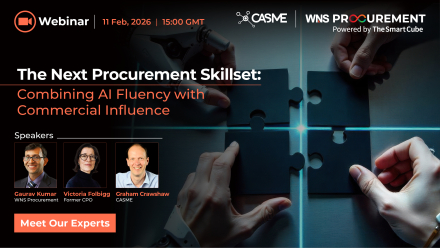
As 2025 draws to a close, senior procurement leaders from across the UK, Europe, and North America gathered at CASME’s Executive Forums in London and New Jersey to pause, reflect, and look ahead.
In a year defined by economic uncertainty, digital acceleration, and mounting operational pressures, these Forums offered something rare - a safe space for open, honest dialogue and peer exchange.
No suppliers. No consultants. No sponsors. Just practical problem-solving: procurement peers exchanging ideas and experiences, sharing frustrations, and offering real-world solutions to the challenges shaping Procurement’s next chapter - one that is more agile, more connected, and more influential than ever before.
A Pulse Check on Procurement 2025
Throughout each of the sessions, spanning organisational design, digital transformation, procurement innovation, talent and risk management, and the future of the function, one message rang clear: Procurement is evolving faster than ever, but often without the tools, skills, or systems to keep pace.
Discussions opened with how operating models are adapting to deliver greater responsiveness and resilience. Delegates compared experiences of decentralised, hybrid, and shared-service models, and ‘engine rooms’ providing help desk-style support to internal stakeholders. The consensus: agility now takes precedence over hierarchy, and the most successful teams are those continuously experimenting and iterating.
Insights from the CASME Executive Forum in New Jersey revealed how global organisations are taking this further, introducing matrix structures that separate global category leadership from regional execution, supported by new stakeholder relationship managers and ‘SWAT teams’ embedded directly within business lines. Some organisations have repurposed existing roles to strengthen engagement without increasing headcount, proving that agility is as much strategic as it is structural.
“Procurement isn’t just about fixing problems anymore. It’s about understanding where the business is going and embedding ourselves in that journey.”
The Digital Frontier - Promise and Frustration
AI and automation dominated the agenda. Participants shared real-world examples of how AI is already transforming spend analytics, contract reviews, and supplier performance tracking; yet also voiced frustration with the limitations of major Source-to-Pay platforms that remain slow, fragmented, and poorly integrated.
Echoing sentiments from the New Jersey Forum, leaders across the Atlantic described testing orchestration tools to streamline complex ERP landscapes, while others are developing leaner, in-house systems. Emerging AI use cases now include automated negotiation scripts, contract metadata checks, and RFP automation - with many organisations embedding API performance as a contractual SLA to guarantee integration reliability.
“We’re going big on AI, not just for tail spend but for smart buying. We’ve even named our front-end agent Gandalf!”
Cyber Risk, Compliance and the Expanding Role of Procurement
Cybersecurity proved one of the agenda’s most thought-provoking topics. Many agreed that Procurement has become an unexpected frontline of cyber defence. Delegates described segmenting suppliers by cyber severity, commissioning ethical hackers for assurance testing, and addressing risk even in ‘low-value’ categories.
“Anything with an IP address can be hacked.”
“Even temperature tags used in vaccine distribution have cyber risk.”
Insights from New Jersey underscored that Procurement is now sharing ownership of supplier onboarding with teams in Legal, InfoSec, GRC, and Privacy. In response to a rise in fraud attempts, several organisations have reinstated manual verification steps, such as telephone checks for bank detail changes, and leveraging tools to detect early warning signals of supplier distress, embedding risk visibility across the entire sourcing lifecycle.
The Human Factor - Skills, Talent and Leadership
Talent emerged as a defining concern for 2026. Procurement is no longer purely commercial; success now depends on a balance of emotional intelligence, digital literacy, and business partnering in equal measure.
“You really need that blended person ... technical understanding plus stakeholder management.”
Participants explored how to cultivate these hybrid skillsets through shared-service models, continuous learning, and AI enablement. Many are piloting ‘prompt libraries’ and internal AI champions to democratise adoption and upskill teams.
In North America, conversations highlighted growing concern over the disappearance of entry-level roles as automation expands. Organisations are responding with internal certification and rotational programmes to develop future leaders. Soft skills, including communication, collaboration and resilience, are seen as key differentiators; several companies have even introduced ‘character under adversity’ interview models, inspired by student-athlete recruitment, to assess adaptability and grit.
The result? Smaller, but more influential teams acting as trusted business partners rather than transactional buyers.
From Contracts to Collaboration
The complexity of software and SaaS negotiation sparked lively debate. Participants agreed it’s ‘a different ballgame’ compared with traditional categories; one that locks buyers into escalating cost structures and long-term dependencies. To counter this, many are introducing pre-engagement playbooks and exit-planning frameworks to strengthen governance and maintain leverage.
“If you’re going to get married to the supplier, what’s the divorce plan?”
Participants also highlighted the growing challenge of supplier financial transparency, particularly under private equity ownership. Several shared innovative ways to track early-warning signals beyond traditional due diligence; using methods such as combining data feeds, credit indicators, and direct supplier dialogue.
There was a strong call for simplification. Procurement wants sourcing templates and contracts that are concise, accessible, and user-friendly; maintaining rigour without unnecessary bureaucracy.
“Templates are too long, too legal - no one reads them.”
Looking Ahead
As the Forums drew to a close, the tone was one of realism balanced with optimism. Despite persistent cost pressures, cyber threats, and the ongoing talent gap, procurement leaders are broadening their influence; now shaping digital ethics, ESG outcomes, and enterprise resilience across their organisations.
“Stakeholder management is more important now than pure cost-saving.”
Across both London and New Jersey, a consistent message resonated: Procurement’s transformation is no longer incremental, it’s systemic. Leaders are reinventing operating models, risk frameworks, and digital ecosystems to build teams that are smaller, smarter, and more embedded in the business than ever before.
“The number one thing we pride ourselves on is relationships. Even as we modernise, procurement must remain human.”
In a world that remains volatile, uncertain, complex, and ambiguous, one truth stands out: Procurement’s edge is no longer just resilience - it’s reinvention, globally recognised and locally applied.
CASME’s Executive Forums reaffirm that Procurement’s value lies in connection. Connecting systems and insights, connecting suppliers to strategy, and connecting people through shared challenges to deliver strategic impact where it matters most.
Real and meaningful insights come from shared experiences. CASME’s peer community brings together procurement professionals facing the same challenges and opportunities. Through in-person and online events, CASME members exchange ideas, share practical solutions and stay ahead of change.
Explore CASME membership and join our mailing list to stay informed.
Back to News



